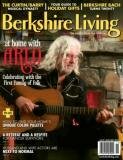
MUSIC FOR LIVING: Bryan Ferry, The Autumn Defense, Natalia Zukerman, Ken Thomson and Slow/Fast, Cassandra Wilson, Philip Selway
 Bryan Ferry
Bryan Ferry
Olympia
Astralwerks
Bryan Ferry has made some pretty good solo albums, and more than a few bad ones, especially in recent years. Consider Olympia a full-fledged funky comeback for Ferry as a singer, songwriter, recording artist, and conceptualist. No doubt the fact that he finally reunited with his original bandmates from Roxy Music—Phil Manzanera, Andy Mackay, and Brian Eno, whose impact can be heard and felt throughout (including, presumably, the prominent use of a Tom Tom Club sample)—for the first time since 1973, had a lot to do with it. And indeed, this could be Ferry’s best work since Roxy’s final release, 1982’s Avalon. But even the presence of other heavyweight musical guests, including Nile Rodgers, Pink Floyd’s David Gilmour, Groove Armada, Scissor Sisters, Marcus Miller, Flea of the Red Hot Chili Peppers, Elvis Costello keyboardist Steve Nieve, and Jonny Greenwood of Radiohead, never overshadows Ferry on what could easily have been a great party album in any of the last four decades, so timeless is Ferry’s art-pop.
 The Autumn Defense
The Autumn Defense
Once Around
Yep Roc
This Wilco side project featuring John Stirratt and Pat Sansone looks unabashedly to 1970s soft rock for inspiration. At its best, on numbers like the insinuating “Once Around” or the Paul McCartney-by-way-of Ben Folds opening track, “Back of My Mind,” the duo conjures up the spirit of the Beatles. At its worst, as on the faux-mystical “Tell Me What You Want,” with its Supertramp-meets-Crosby, Stills and Nash harmonies, or on the treacly “There Will Always Be a Way,” a misfired attempt at blue-eyed soul on which the duo comes across like stale, cut-rate Bread—which, after all, was already a cut-rate Beatles the first time around—these guys are reviving sounds that had better been left for dead.
 Natalia Zukerman
Natalia Zukerman
Gas Station Roses
Weasel Records
Natalia Zukerman has already established her bona fides as a dynamite roots musician (if it’s got six strings, she can play it, and dazzlingly so) and as a songwriter with a keen eye for character and detail on previous albums. All the more reason to celebrate Gas Station Roses, on which the multitalented Zukerman flowers as a fully mature artist fronting a roots-rock ensemble including producer-guitarist Willy Porter, bassist Todd Sickafoose, drummer Dave Schoepke, and Patty Larkin, Garrison Starr, and Adrianne Gonzalez on background vocals. Combining the incisive songcraft of Shawn Colvin, the bluesy confidence of Bonnie Raitt, the Americana grit of Lucinda Williams, and the independent streak of Ani DiFranco, Zukerman commands—no, demands—attention on hard-rocking songs like the sultry, sexy title track, and the fetching, funky folk of “Brooklyn.” She does so, for the most part, via compelling, all-knowing vocals, boasting intimate, jazzy phrasing and a wide spectrum of tone and color, ranging from a Billie Holiday-like purr to an Aretha Franklin-like roar.
 Ken Thomson and Slow/Fast
Ken Thomson and Slow/Fast
It Would Be Easier If
Intuition
Ken Thomson’s It Would Be Easier If establishes the reedman, composer, and bandleader as a musical visionary without borders on par with Bill Frisell and Dave Douglas. Thomson’s complex compositions, which veer from delicate and lyrical (the title track) to frenzied and hammering (“Goddamn You, Ice Cream Truck”) and from regularly melodic (“Kleine Helmet”) to seemingly free-played improvisation (“No, No, No”), are imbued with rich color and dynamism by his sterling ensemble, including trumpeter Russ Johnson, guitarist Nir Felder, bassist Adam Armstrong, and drummer Fred Kennedy. Thomson, a cofounder of the band Gutbucket who is part of the Bang on a Can family, calls his music “21st-century third stream,” but I call it the sound of the Brooklyn avant-garde.
 Cassandra Wilson
Cassandra Wilson
Silver Pony
Blue Note
This unusual hybrid of live and studio sessions (sometimes merging the two in one song), recorded in Europe and New Orleans with a stellar band including guitarist Marvin Sewell, bassist Reginald Veal, drummer Herlin Riley, and keyboardist Jonathan Batiste, is a wonderful platform for jazz vocalist-bandleader Cassandra Wilson’s idiosyncratic style and approach that merges Delta blues, Mardi Gras, funk, soul, folk, and pop music into a unique gumbo all her own. Wilson takes songs by Charley Patton, Muddy Waters, Oscar Hammerstein, the Beatles, Stevie Wonder, and John Legend (who lends his vocals to “Watch the Sunrise,” which he penned for Wilson) and makes them her own, caressing them with her husky, chocolaty vibrato, in what just may be her most accessible effort yet.
 Philip Selway
Philip Selway
Familial
Nonesuch
This singer-songwriter album sounds nothing like what you might expect from Radiohead’s drummer working with two members of Wilco (talk about a supergroup right there) plus multi-instrumentalist and vocalist Lisa Germano and former Soul Coughing bassist Sebastian Steinberg. Instead, it is an intimate, moody, atmospheric collection of mostly acoustic, guitar-based numbers sung in Selway’s whispery vocals—more Elliott Smith or Nick Drake than Thom Yorke (although he does a respectable imitation of the latter on “Beyond Reason”)—with hardly any percussion (even though Selway is joined here by Wilco drummer Glenn Kotche, as well as multi-instrumentalist Pat Sansone). “The Ties That Bind Us” is a gorgeous paean to familial bliss that makes full, if subtle, use of Selway’s accompanists, sounding not unlike some of Germano’s solo sonic experiments.

 Delicious
Delicious Digg
Digg StumbleUpon
StumbleUpon Propeller
Propeller Reddit
Reddit Magnoliacom
Magnoliacom Newsvine
Newsvine Technorati
Technorati
